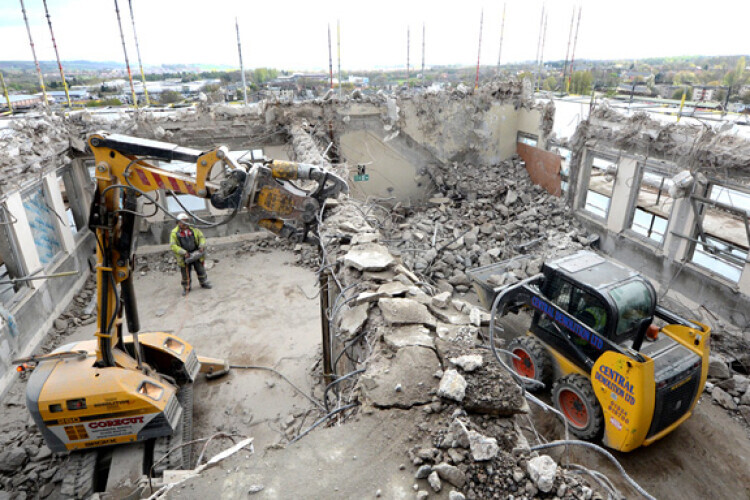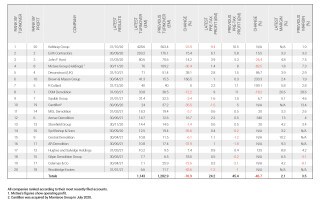Our assessment of the top 20 demolition specialists’ financial performance this time last year drew criticism from other, well-informed, industry pundits.
Our summary back then was that demolition contractors were “winning more work but making less money” – and that was simply not the case for everybody, said our critic. The sector in general was doing well.
And indeed, he had a point. Our regular analysis cannot delve into the business of every specialist in a particular sector, which is why we select what we believe to be the 20 biggest players in their field and take a look at their financial results.
It’s not an exact science. But having said all that, we’re now bracing ourselves for more indignation – because this year our analysis shows that our selection of 20 top demolition firms are winning less work and making a lot less money.
Total turnover is down almost 11%, from £1.3bn last year to just over £1.1bn this year, but the total pre-tax profit figure has plummeted almost 47%, from £45.4m to just £24.2m.
The most influential factor at play here is the performance of the sector’s leading contractor, Keltbray. It’s still by far the biggest demolition specialist out there and that means that any significant shift in its turnover or profit figures has a distorting effect on the overall picture – especially when ‘overall picture’ in this context means only 20 businesses.
In the 12 months to October 2020, Kelbray turned over £428.6m, down almost 24% from the previous year (2019: £563.4m). And while in 2019 Keltbray made a pre-tax profit of £10.5m, in 2020 that became a pre-tax loss of -£9.4m.
In his strategic report for the period, Keltbray director John Keehan reported that the group “continued to deliver a robust cash performance,” but acknowledged that the financial performance was disappointing “for a number of reasons, principal among which was the Covid pandemic and the negative impact of the UK government’s protracted exit from the European Union and associated cooling market sentiment.”
The pre-tax loss “masked a strong cash performance with net cash and cash equivalents of £25m. In the context of the current market conditions, this can be considered a satisfactory outturn,” said Keehan.
Also reporting satisfactory results, but minus the expressions of disappointment, is Erith Contractors – at second place on our table. Erith’s results are for the year to October 2020 and if they look familiar that is because these figures are the same as we reported last year; they were published in April 2021. We shall have to wait until 30th June, when Erith’s next accounts are due, to find out how things went last year.
One name that has consistently appeared among our top 20 demolition specialists is missing this year: TE Scudder, in at number eight last year, has been wound up.
Scudder was part of the Carey Group which has undergone a major restructuring. In 2020 the group board decided to focus on its civil engineering (Careys) and dry lining (BDL) businesses and close TE Scudder along with its house-building business, Carey New Homes.
In its report for the 18 months to 30th September, Carey Group explained that “Demolition services previously conducted by Scudder are now performed by Careys Civil Engineering. On 23rd March 2020 as a board of directors and with the support of the founders of the Carey Group, we made the decision to close our site operations in response to the Covid-19 pandemic.”
Having restructured and closed down its loss-making businesses, Carey Group now looks slimmer, but fitter.

The same can be said of Coleman & Co, which saw a huge drop in turnover for the year to April 2021, but saw a return to profit after more than two years of losses.
Coleman also initiated a major restructuring in 2020 in response to the economic impact of Covid-19. Delays and cancellation of key contracts forced the Birmingham-based company to tighten its belt and reduce the size of the business by half.
Consequently, last year’s turnover was just £7.1m, down a whacking 73% from £25.9m in 2020. However, the company was at last back in the black, with a pre-tax profit of £342,832, compared with 2020’s pre-tax loss of -£2.1m.
“The company’s financial performance has seen a positive improvement throughout difficult times: the Covid pandemic, negative impact of the government’s protracted exit from the EU and associated cooling in the market,” the company reported.
“The directors are pleased to report that, since the successful execution of the transition plan embarked on from March 2020, the company has had a very successful trading period”.
Coleman isn’t the only major demolition contractor to cut its coat to suit its cloth. Leicestershire-based AR Demolition now has a new ownership structure following several difficult years of trading. Managing director Mike Henderson and finance director Matt Munro completed a management buy-in in 2020 and now control the business alongside founder and chief executive Richard Dolman.
In its report to the year to June 2021, the company said: “The directors are delighted to report that the business has seen a return to profitability following a successful restructuring in the previous financial year.”
It continued: “This return to profitability has been delivered despite the challenges presented by the Covid-19 pandemic and we continue to see a steady workflow and strong pipeline.”
In the year to June 2021, AR Demolition turned over £10.8m, down 38% from £17.4m in 2020. But pre-tax profit margin was almost 10% – the company was in the black to the tune of £1m. In 2020 the business made a £1.8m loss before tax.
Finally, Kent-based demolition contractor Brown & Mason Group saw both turnover and profit figures take a healthy upswing in the year ending 30th April 2021.
As we explained last year, Brown & Mason Ltd and Brown & Mason Holdings were put into administration in 2020 and their entire assets, contracts and order book transferred to the former plant hire division, which was renamed Brown & Mason Group.
Despite the ravages of Covid-19, turnover last year climbed strongly, to £41.3m from £15.5m in 2020. Pre-tax profit also grew from £314,557 to just over £1m.
The Covid-19 outbreak “[reached] every core element within the company’s operational activities; from site closures to a severe contraction in working capital, to an urgent requirement for substantial investment in PPE,” reported Brown & Mason.
But the business rose to the challenge, with management taking “decisive action” to adapt to the challenges faced: “The results for the year are a testament to this hard work, given none of these costs could be passed on to customers”.
Got a story? Email news@theconstructionindex.co.uk




